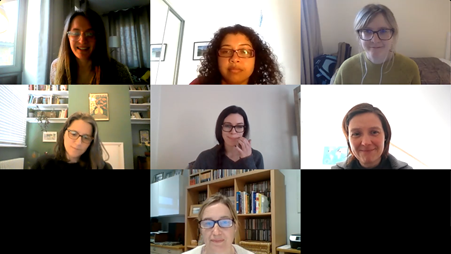Since the COVID-19 pandemic began, we have all had to adapt to a new way of working. Our academic lives, once filled with in-person conferences, training and data collection, switched to the virtual world. In this blog, I will share what I have learnt, from my own experience and from colleagues, about ways to adapt your work to an online format. Practical tips on hosting online events are one thing, engaging your audience remotely is another. I will share our top tips to keep workshops interactive and consider how the applies to engaging people with dementia in the move to remote working.

5 factors to a healthy brain
During my PhD I was awarded the Beacon Bursary [1], a public engagement fund supported by UCL Culture. I developed and hosted the Body and Brain workshop which focused on ways to achieve brain health using physical health strategies such as healthy eating. I worked with Diabetes UK [2] and the Stroke Association [3] to run these health education workshops. I developed a video of discussion points [4] for other organisations to use with people interested in the link between the body and brain.
Due to ongoing social distancing guidelines, I knew the workshops would be conducted remotely. I also knew I had many colleagues in a similar position and wanted to hear their experiences of adapting content to an online format. So, I brought together academics to share their lessons learnt on how to adapt and run remote workshops effectively. The group had a variety of experience: in hosting training for academics, focus groups for those who deliver arts and cultural projects, conferences focused on aging and dementia and interventions for people with mild cognitive impairment. All agreed that online formats increased accessibility by removing travel issues and through reaching a wider audience by promotion on social media.
Tips for academics hosting online event
- Decide on your software– Zoom may be more familiar to members of the public from interacting with family, friends and social groups throughout the pandemic. Microsoft Teams may be more familiar to us academics but make sure all facilitators are aware of any new features.
- Time is different online– Be flexible with your content. Prioritise key messages you want to get across to allow for lots of interaction. Concentration levels differ online with one hour often being the limit!
- Plan and be prepared– Technical difficulties come part and parcel with working online. Try to plan for any technical difficulties by having a run through before your event and starting the meeting early. Having a facilitator to work with you is a MUST. They will help you to admit participants, take minutes and support people who may have difficulties connecting.
Tips for remote engagement
- Keep it small– As in person, workshops are best in smaller groups. Having no more than 10 people per workshop will facilitate discussion and also be easier to see on gallery view! Minimising slide use is also beneficial for a sense of connection.
- Have an offline component– Engaging with your participants physical space, for example printed or drawing material, can make workshops more interactive. Send material out in advance to make the most of offline spaces.
- Feeling comfortable in the online space– Dedicate time at the beginning of your workshop for people to introduce themselves. It’s important for people to find their voices in the space to feel confident to participate.
- To see or not to see– Encourage participants to have their video on by acknowledging the difficulties of being at home. Set the culture of a meeting to be inclusive and work with participants to understand what they consider to be a safe space.

How to involve people with dementia in workshops?
- Consider digital competency– but don’t assume older people won’t have any. Many people do have access to technology but require support to join workshops. This can be from family members or from workshop hosts. Offering a conservation prior to the workshop can support participants to learn a new platform and to understand features such as gallery view and the raised hand function.
- Watch your language– phrases which might be second nature to you or I might cause confusion. Remain mindful of technical jargon, explain what is happening on screen, and allow people to reorientate themselves following screen changes. Offering an informal chat after the workshop provides an opportunity for your participants to ask questions- replacing in-person opportunities at tea breaks or when leaving the session.

From right to left: Me, Danielle Nimmons (Academic Clinical Fellow, UCL), Katey Warran (Research Fellow, UCL), Penny Rapaport (Clinical Psychologist, UCL), Clarissa Giebel (Senior Research Fellow, University of Liverpool), Michaela Poppe (Senior Research Fellow, UCL), and Christine Carter (PhD Student, UCL).
Overall, we found that people with cognitive impairment were grateful for the opportunity to connect with others, even online. However, it’s important to acknowledge that remote contact does not replace face-to-face interactions. In fact, we found that some older people with long-term conditions would prefer to wait for in-person events instead of interacting online. As we move into life post-pandemic, hybrid events with both in-person and online elements may be the answer to provide digital accessibility whilst also acknowledging the importance of in-person contact.
Thank you to everyone who shared learning for this blog.

Jessica Rees
Author
Jessica Rees [5] is in the the final stages of her PhD which focuses on supporting the management of long-term conditions in dementia. Originally from from North Wales, her interest in Health Psychology stemmed from undertaking a Masters in Psychological Sciences at the University of Liverpool.